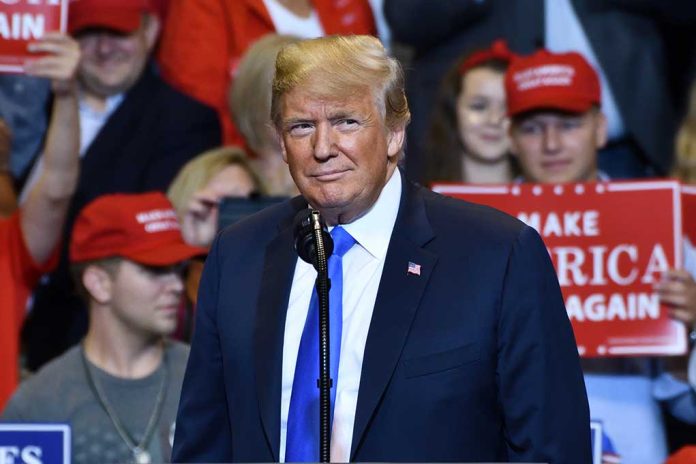
Twelve states file legal challenges against President Trump’s strategic tariffs, but the administration maintains these actions are fully justified under the 1977 International Emergency Economic Powers Act to protect national security and American workers.
Key Takeaways
- President Trump has imposed tariffs on imports from countries including China, Canada, and Mexico, citing trade deficits as a national security concern
- The administration invoked the 1977 International Emergency Economic Powers Act (IEPPA) to justify the tariffs, pointing to President Nixon’s 1971 use of tariffs during an economic crisis as precedent
- Twelve states have challenged the tariffs in federal court, arguing that trade deficits don’t constitute an “unusual and extraordinary threat.”
- Despite legal challenges, Trump has secured historic trade agreements with China and the UK, including provisions to combat the flow of fentanyl
- Certain goods, including steel, aluminum, and pharmaceuticals, are exempt from the tariffs
Trump’s Tariff Strategy Faces Legal Scrutiny
President Trump’s America-first trade policies have ignited a significant legal battle as twelve states have urged a federal court to strike down his sweeping tariffs. The states claim the President exceeded his authority and caused economic disruption by imposing tariffs aimed at addressing America’s persistent trade deficits with countries including China, Canada, and Mexico. A three-judge panel of the U.S. Court of International Trade in New York is currently hearing arguments in what has become one of at least seven lawsuits challenging these tariffs, which form the cornerstone of Trump’s trade policy aimed at protecting American manufacturing and workers.
“This is not an unusual problem,” said Brian Marshall, arguing for the states challenging the tariffs in court.
The legal dispute centers on Trump’s invocation of the 1977 International Emergency Economic Powers Act (IEPPA), under which he declared trade deficits a national emergency. The states contend that the IEPPA does not authorize tariffs and that trade deficits do not constitute an “unusual and extraordinary threat” as required by the law. Trump’s administration has countered by pointing to historical precedent, specifically President Nixon’s use of tariffs during a 1971 economic crisis. Brett Shumate, representing the government, dismissed the states’ challenge as “political” rather than legal.
National Security Justification and Emergency Powers
President Trump has been explicit about the national security implications of America’s trade deficits, which he argues have weakened the country’s manufacturing base and supply chains while increasing dependence on foreign adversaries. In declaring a national emergency, Trump emphasized that these deficits represent a genuine threat to America’s economic sovereignty and competitive edge. The administration maintains that the tariffs will remain in place until the trade deficit threat is resolved, with the President retaining authority to modify them based on trading partners’ actions.
“I don’t believe that American consumers will see any meaningful increase in the prices that they face,” said Former Biden Treasury Secretary Janet Yellen.
Critics have argued that the use of emergency powers for trade policy sets a dangerous precedent, but supporters counter that America’s declining manufacturing output and competitive disadvantage in global markets justify extraordinary measures. The administration has highlighted that the U.S. has historically maintained one of the lowest average tariff rates globally, while key trading partners have imposed higher rates and significant non-tariff barriers that restrict U.S. market access, particularly in countries like China and India.
Historic Trade Wins Amid Legal Challenges
Despite the ongoing legal battles, President Trump has secured major trade victories, including a historic agreement with China following a recent deal with the United Kingdom. This agreement involves both nations reducing tariffs by 115% while maintaining an additional 10% tariff, with implementation scheduled for May 14, 2025. Importantly, China has agreed to remove retaliatory tariffs and suspend non-tariff countermeasures against the U.S. that were announced since April 2025, while the U.S. will remove additional tariffs imposed on China during the same period.
“This trade deal is a win for the United States, demonstrating President Trump’s unparalleled expertise in securing deals that benefit the American people,” said President Donald Trump.
Significantly, the U.S. will retain pre-existing tariffs, including those related to the fentanyl national emergency, underscoring the administration’s commitment to combating drug trafficking. Both nations have agreed to establish a mechanism for ongoing trade and economic discussions with representatives from both sides and will collaborate to combat the flow of fentanyl and other precursors to illicit drug producers in North America. This agreement demonstrates Trump’s ability to leverage tariffs as a negotiating tool to achieve broader national security objectives.
Making America Competitive Again
The Trump administration’s tariff strategy extends beyond simply addressing trade imbalances to focus on rebuilding America’s manufacturing capacity, which is viewed as essential for national security. By confronting unfair tariff disparities and non-tariff barriers imposed by trading partners, Trump aims to ensure fair trade, protect American workers, and significantly reduce the trade deficit. The President has emphasized “Made in America” as a priority, seeking to increase domestic manufacturing after decades of decline that have left critical supply chains vulnerable.
“Unlike previous administrations, President Trump took a tough, uncompromising stance on China to protect American interests and stop unfair trade practices,” said President Donald Trump.
While the tariffs have affected global financial markets, they have had a limited impact on the U.S. economy thus far. Certain goods, including steel, aluminum, and pharmaceuticals, remain exempt from these tariffs, reflecting a strategic approach that protects critical industries while applying pressure where needed. As legal challenges continue, the administration remains confident in the solid legal foundation for these tariffs under the Emergency Powers Act and their necessity for protecting America’s economic sovereignty in an increasingly competitive global marketplace.



